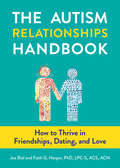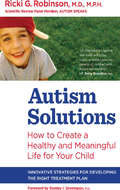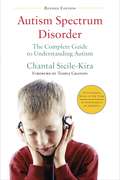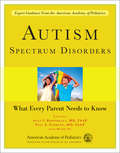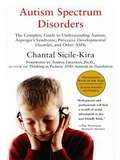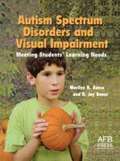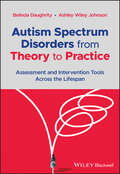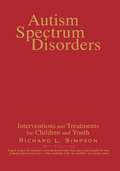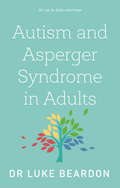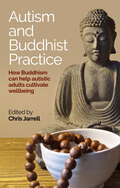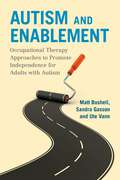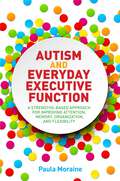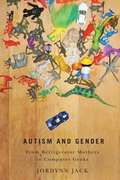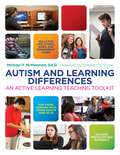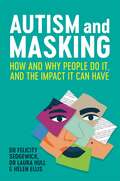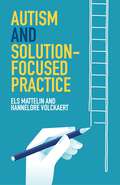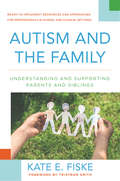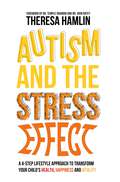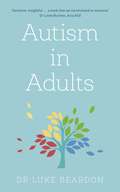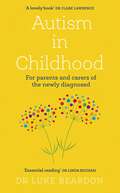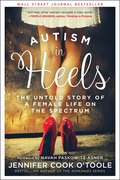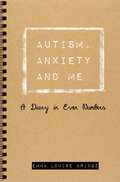- Table View
- List View
Autism Relationships Handbook, The: How to Thrive in Friendships, Dating, and Love
by Joe Biel Faith G. Harper, PhD, LPC-S, ACS, ACNEver since he came out as autistic, people have been contacting Joe to share their stories and ask questions. The most common question by far: how do I find a romantic partner?Dr. Faith G. Harper, author of Unfuck Your Brain and Unfuck Your Intimacy joins autistic publisher and author Joe Biel to offer hard-won guidance on a wide range of topics about friendships, dating, and romance and answer a ton of questions. What do you want out of a relationship? What is the difference between flirting and harassment? How do you have a fun date and get to know someone when eye contact and prolonged conversation aren't your strengths? How do you change a casual acquaintance into friendship or dating? How do you express your needs and make sure you're hearing your partner when they express theirs? How do you maintain a healthy, happy long term relationship? Autistic readers will find valuable answers and perspectives in this book, whether you're just getting ready to jump into dating, seeking to forge closer friendships, or looking to improve your existing partnership or marriage.
Autism Solutions
by Ricki G. RobinsonFor twenty years Dr. Ricki Robinson has been providing hope and help for children with Autism Spectrum Disorders. Her integrative, strengths-based approach to treatment includes a thorough evaluation of your child's medical, developmental, social, emotional, behavioral and educational issues to find the solutions that maximize your child's health and well-being.Autism Solutions gives parents a greater understanding of their child's unique learning, sensory and medical profile. Recognizing that no parent can do this alone, Dr. Robinson explains how to establish a team of professionals who can work with the child to give him or her the opportunity to live well, learn, interact and thrive.Autism Solutions covers a wide range of issues, including:* Helping your child relate, communicate and think* Recognizing and overcoming common health challenges* Effectively treating diseases and disorders that frequently accompany autism* Understanding how behavior can be a form of communication and how to "hear" what a child is telling you* Unlocking your child's full potential
Autism Spectrum Disorder (revised)
by Chantal Sicile-KiraNewly revised and updated, this award-winning guide covers every aspect of understanding and living with autism today Comprehensive and authoritative, Autism Spectrum Disorders explains all aspects of the condition, and is written for parents, educators, caregivers, and others looking for accurate information and expert insight. Newly updated to reflect the latest research, treatment methods, and DSM-V criteria, this invaluable book covers: • The causes of autism spectrum disorders • Getting an accurate diagnosis • Treatments based on behavioral, psychological, and biomedical interventions • Coping strategies for families and education needs and programs • Living and working conditions for adults with ASD • Community interaction and teaching strategies and resources for educators and other professionals
Autism Spectrum Disorders
by Paul S. Carbone Alan I. RosenblattAutism Spectrum Disorders: What Every Parent Needs to Know is an invaluable resource for parents and caregivers of children who have been diagnosed with an autism spectrum disorder (ASD). Prepared under the editorial direction of 2 distinguished pediatricians who are autism experts-one of whom is also the parent of a son with autism-this book helps you understand how ASDs are defined and diagnosed and provides you with information on the most current types of behavioral and developmental therapies. It also helps parents understand what they can do to help promote a smooth transition from adolescence through the teen years and into adulthood.Topics include Symptoms, frequency, and types of ASDs Accessing care Services in the community Tapping into educational resources Behavioral and developmental treatment The role of complementary and alternative medicine Screening tools Adolescence and beyondYou'll also find inspirational and supportive stories from other parents that will help you recognize that you're not alone on this journey. Autism Spectrum Disorders: What Every Parent Needs to Know provides you with tools to help navigate the sometimes challenging world of autism spectrum disorders.
Autism Spectrum Disorders
by Sicile-Kira ChantalThe National Autistic Society estimates that Autism Spectrum Disorders (ASD) now affects 500,000 families in the UK alone, while one in 86 children have an ASD-related special educational need. Autism Spectrum Disorders is an essential one-stop reference guide introducing the reader to an understanding of this complex disorder, touching on all aspects related to ASD (including Asperger's Syndrome), with a detailed resource section for those wanting more in-depth information on specific areas. The book is invaluable not only for parents and professionals who work with children but also for potential employees and anyone who works in the public sphere. With chapters on the causes of ASD, diagnosis, treatment and diet, this is a uniquely accessible guide providing practical information in a clear and concise manner. 'Given autism's high-profile media, Chantal Sicile-Kira's book could not be more timely. This will be one of those smart, authoritative, user-friendly guides which will be the essential volume that both parents, health professionals and a wide general readership will reach for in order to fathom this confounding condition' Douglas Kennedy
Autism Spectrum Disorders and Visual Impairments: Meeting Students' Learning Needs
by Marilyn H. Gense D. Jay GenseThis resource for educators describes some of the complex and varied effects on learning and behavior that result when a child with autism or a related disorder is also visually impaired. Two experienced special education practitioners outline core principles for designing effective instructional programs that meet the particular needs of these students. They also describe strategies for conducting assessments, encouraging social development, handling challenging behaviors, and helping students explore career possibilities. Annotation ©2005 Book News, Inc. , Portland, OR (booknews. com)
Autism Spectrum Disorders from Theory to Practice: Assessment and Intervention Tools Across the Lifespan
by Ashley Wiley Johnson Belinda DaughrityAutism Spectrum Disorders from Theory to Practice Apply the latest ASD theory to assessment and intervention in real-world clinical environments In Autism Spectrum Disorders from Theory to Practice, a team of experienced interventionists deliver a practical application of modern theory regarding autism spectrum disorders (ASDs) to common, real-world clinical situations. Hands-on guidance is paired with advice on culturally appropriate and responsive practices informed by professionals who collectively have over 40 years of combined speech pathology experience. The work of special contributors like Dr. Pamela Wiley, who is the Founder and President of the Los Angeles Speech and Language Therapy Center, appears alongside evidence-based ASD intervention instruction that draws from the latest studies and from the authors’ assessments and interventions with clients from a diverse range of backgrounds. When combined with the reader’s own professional competence, clinical experiences, and continuing education, this book is a powerful resource that will improve patient outcomes. Autism Spectrum Disorders readers will also find: Personal anecdotes from the authors’ clinical practices to help illustrate the application of the concepts discussed within Active Learning Tasks that educators can use to promote learning activities that encourage direct engagement with the material Helpful and illustrative diagrams included throughout the text to help elucidate points and clarify information in each chapter Goal Spotlights that provide sample intervention goals practitioners can use with actual clients with autism Reflection Letters in which individuals from various perspectives and backgrounds—from autism researchers to developmental psychologists, advocates such as Holly Robinson Peete, and adults thriving with autism—describe their experiences Autism Spectrum Disorders from Theory to Practice is a useful reference for new and experienced practitioners in the field of autism research, speech-language pathologists, developmental psychologists, adapted physical education teachers, professors, and those affected by ASD in their everyday life.
Autism Spectrum Disorders: Interventions and Treatments for Children and Youth
by Brenda Smith Myles Richard L. Simpson Sonja De Boer-Ott Sara E. Byrd Lisa Garriott Adams Josefa Ben-Arieh Katherine T. Cook Jennifer B. Ganz Deborah E. Griswold Sue Ann Kline Kaye OttenAutism Spectrum Disorders presents the best validation criteria we currently have to offer children with ASD, and provides a blueprint for future work in this area. A long overdue wake-up call to the field, and one that is highly recommended. ' - Gary Sasso, Chairperson, Department of Curriculum and Instruction , University of Iowa 'This excellent compendium will prove invaluable for anyone who wants to identify and evaluate commonly used treatments and interventions for individuals with autism spectrum disorders. ' - Juane Heflin, Associate Professor, Georgia State University How can you best help a child with autism reach their full potential? Autism Spectrum Disorders (ASD) present a perplexing challenge for parents and school professionals. Literally dozens of interventions and treatments are available, so how does one know which intervention strategy works best for any given child or situation? This essential new resource, Autism Spectrum Disorders, was developed to respond directly to the extraordinary difficulty school professionals and families face in selecting and applying appropriate, effective interventions and treatments for the children in their care. The information is presented in a straightforward and simple format, practical for finding clear answers to complex questions. For easy access, the book is organized into the following five intervention categories-Interpersonal Relationships, Skill-Based Treatment Programs, Cognitive Methods, Physiological/Biological/Neurological Approaches, and Other Treatments and Interventions. Each category contains several detailed reviews, including: " A description of the intervention or treatment " Reported benefits and effects associated with its use " A synthesis of how the outcomes relate to individuals with ASD " A discussion of who is best qualified to implement it, including when and where " Potential costs and risks Comprehensive in scope, this resource briefly evaluates over 40 commonly used and purported interventions and treatments for individuals with ASD, as well as detailed evaluations of their utility and efficiency. It will assist readers in critically evaluating and choosing those methods that have the highest probability of yielding benefits for this special population.
Autism and Asperger Syndrome in Adults
by Luke BeardonEstimated to affect just over 1 per cent of the adult population in the UK - some 700,000 individuals ? autism is still persistently viewed as a disorder or impairment ? but, this concept needs to be challenged. Written by a university lecturer with several years? experience in the field, this book presents an up-to-date overview of autism and Asperger syndrome, and comments on the realities of adult life including further and higher education, employment, dating and parenthood. For autistic children, teenagers and adults, their families and friends, and any professionals interested in autism. Topics include:Terminology and what?s preferredCommon myths and stereotypesDiagnosis and related issuesTips for undiagnosed adults Understanding how autism impacts on the individualSensory issuesTransition into adulthoodFriendships and intimate relationshipsThe Criminal Justice System - what happens when autistic people break the lawIn this sensitive and insightful book, Dr Luke Beardon asserts that there are many hugely intelligent, empathic, kind, caring, loyal and skilled autistic individuals ? so it?s time to treat them as such and respect their differences.
Autism and Asperger Syndrome in Adults
by Luke Beardon'Luke has years of valuable experience, and is always thinking and learning about autism' - Professor Nicola MartinHave you recently been diagnosed as autistic?Do you suspect you might be autistic?If you've recently been diagnosed as autistic, think you may be or are close to someone who is, one of the things you will like most about this book is the way in which it challenges the idea of autism as a 'disorder' or 'impairment'.Instead, Dr Luke Beardon will help you to reframe what you feel, and challenge what you know, about being on the spectrum. He explains how autism impacts on the individual, and what purpose a diagnosis might - or might not - serve. There is a lot of myth-busting, and dismantling of the stereotypes and clichés around ASD and areas like communication, social interaction and relationships. Practical tips for undiagnosed adults will help you navigate things like school, work, study, parenthood and even to understand what happens when autistic people break the law.Above all, this book is a celebration of what it means to be autistic - of the passion, honesty, humour, lack of ego, loyalty and trustworthiness that make you, or your loved one, such an amazing person.
Autism and Buddhist Practice: How Buddhism Can Help Autistic Adults Cultivate Wellbeing
by Chris JarrellThis series of reflective accounts explores the benefits that Buddhist practice can bring for autistic individuals, and outlines how Dharma teachers, centre directors and meditation group leaders can help ensure sessions are truly autism sensitive.Including a wide range of international contributors discussing aspects of their autistic experience and the impact of Buddhism on their lives, this is a thought-provoking and often moving portrayal of the intersect between the lived experience of autistic people and spiritual practice. The deeply personal accounts of the positive impact Buddhist practices have had on relationships, social interactions, sensory overload, mental health and wellbeing, provide an opportunity to find out more about both Buddhism and the support that it can offer to the autistic community through, for example, personal practice, parenting and special educational provision.
Autism and Enablement: Occupational Therapy Approaches to Promote Independence for Adults with Autism
by Matt Bushell Sandra Gasson Ute VannAdults with Autism Spectrum Conditions (ASC) or a suspected diagnosis often have hidden needs that go unmet by public services. This book describes and analyses the Kent ASC enablement approach, a short-term intervention led by occupational therapy to promote people with ASC becoming more self-aware and self-sufficient outside of public services. Designed to teach adults with ASC strategies for controlling their sensory, motor-processing and social-communication needs and preferences, this person-centred approach gives them greater self-management over their lives. The book also provides an overview of a range of both professional and self-help tools and technologies which can be used by adults with ASC to increase independence and wellbeing. Case-studies demonstrate the transformative effects of enablement on daily life for adults with ASC. The book also provides recommendation for building on the enablement approach.
Autism and Everyday Executive Function: A Strengths-Based Approach for Improving Attention, Memory, Organization and Flexibility
by Paula MoraineUnderstand and support executive function in individuals with Autism Spectrum Disorder (ASD) with this fully-explained, innovative model. Showing how to use an individual's strengths to address executive functioning weaknesses, this approach will also help to build a strong foundation for social and communication skills. Advocating a person-centred approach, the author describes the importance of identifying the individual's preferred style of engagement and communication, and how sensory experiences impact their thoughts, feelings, and actions. She explains how to use this information to identify the individual's strengths and weaknesses across eight key areas which are the building blocks of executive functions: attention; memory; organization; time management; initiative; behavior; goal setting and flexibility. These areas can be used daily to establish predictability and offer a foundation for interpreting, processing and understanding the world with flexibility. Professionals and parents can also use them as the basis of an Individualized Education Plan (IEP), or to create personalized interventions and support at school or at home.
Autism and Gender: From Refrigerator Mothers to Computer Geeks
by Jordynn JackThe reasons behind the increase in autism diagnoses have become hotly contested in the media as well as within the medical, scholarly, and autistic communities. Jordynn Jack suggests the proliferating number of discussions point to autism as a rhetorical phenomenon that engenders attempts to persuade through arguments, appeals to emotions, and representational strategies. In Autism and Gender: From Refrigerator Mothers to Computer Geeks, Jack focuses on the ways gender influences popular discussion and understanding of autism's causes and effects. She identifies gendered theories like the “refrigerator mother” theory, for example, which blames emotionally distant mothers for autism, and the “extreme male brain” theory, which links autism to the modes of systematic thinking found in male computer geeks. Jack's analysis reveals how people employ such highly gendered theories to craft rhetorical narratives around stock characters--fix-it dads, heroic mother warriors rescuing children from autism--that advocate for ends beyond the story itself while also allowing the storyteller to gain authority, understand the disorder, and take part in debates. Autism and Gender reveals the ways we build narratives around controversial topics while offering new insights into the ways rhetorical inquiry can and does contribute to conversations about gender and disability.
Autism and Learning Differences: An Active Learning Teaching Toolkit
by Michael P. Mcmanmon Stephen M. ShoreTeaching essential skills for life, school, work, and independent living, this comprehensive and practical toolkit supports educators and clinicians in their work with adolescents and young adults with an Autism Spectrum Disorder (ASD) or Learning Difference (LD) diagnosis. It presents tried-and-true strategies that address difficulties with social skills and Executive Function, cognitive rigidity, self-esteem issues, and more. It includes: - Focused chapters on skills for life, school, work, and independent living - Photocopiable teaching materials and tips for classroom management - Sections on peer-mentoring, mediation, and inclusion - Assessment strategies, including student self-assessment materials and feedback forms - Contributions from experts in the field, including Dr. Stephen Shore, Liane Holliday Willey, Dr. Brenda Smith Myles, Barbara Bissonnette and Jennifer Cook O'Toole. Drawing on over 30 years' teaching experience at the College Internship Program (CIP), Dr. Michael P. McManmon's toolkit is a complete curriculum for educators, clinicians, and professionals who teach or advise young adults on the ASD or LD Spectrum. It can also be used effectively by parents and individuals for self-study.
Autism and Masking: How and Why People Do It, and the Impact It Can Have
by Helen Ellis Felicity Sedgewick Laura HullAutistic people often feel they have to present as neurotypical or perform neurotypical social behaviours in order to fit in. So-called 'masking' is a social survival strategy used by autistic people in situations where neurodiversity is not understood or welcomed. While this is a commonly observed phenomenon in the autistic community, the complexities of masking are still not widely understood.This book combines the latest research with personal case studies detailing autistic experiences of masking. It explains what masking is and the various strategies used to mask in social situations. The research also delves into the psychology behind masking and the specifics of masking at school, at social events with peers, and at work. The book looks at the consequences of masking, including the toll it can have on mental and physical health, and suggests guidance for family, professionals, and employers to ameliorate negative effects. With a diverse range of voices, including perspectives across gender, ethnicity and age, this is the comprehensive guide to masking and how to support autistic people who mask.
Autism and Solution-focused Practice
by Elaine Cook Els Mattelin Hannelore VolckaertTo help clients with autism think differently about their future, practitioners need to think differently about autism... Solution-focused practice is founded on a firm belief that the full potential of every human being can be realized. This concise, pragmatic guide explains how the practice can be effectively adapted to help clients on the autism spectrum find solutions to their problems, by addressing autism not as a disability but as a different way of thinking. The first section is a helpful introduction to how solution-focused practitioners can gain an understanding of autism by viewing it from a 'different culture' perspective; the second part offers handy rules and tips for applying knowledge respectfully and creating successful conversations with clients. People with autism often feel let down by social support services. This forward-thinking book is a vital resource for helping clients feel welcome and empowered in helping settings and beyond.
Autism and the Family: Understanding and Supporting Parents and Siblings
by Kate E. Fiske Tristram SmithReady-to-implement resources and approaches for effective professional care in school and clinical settings. The reverberations of autism spectrum disorders among parents and siblings can be complex. Parents may grapple with the impact of their child's initial diagnosis, wrestle with the tension between their professional ambitions and family obligations, and labor to maintain a healthy union with their partners. Brothers and sisters may be given less attention, asked to assume a more adult role than they feel ready for, or strive for meaningful connection and communication with their sibling and parents. Although the energy of clinicians, teachers, and other professionals working with individuals with autism spectrum disorder is often focused intensively on the child who is diagnosed, the practitioner can also be an invaluable resource for the child's family. Drawing upon clinical research and firsthand family interviews, this book helps clinicians understand the experiences of parents and siblings of a child with ASD from the time of diagnosis through adulthood. It provides clear recommendations for sensitive, informed professional support. Step-by-step in each chapter, Fiske elucidates such vital subjects as: Understanding the experience of diagnosis Recognizing patterns of parent stress over time Appreciating and navigating the effects of ASD on relationships between parents Involving and providing support for siblings Integrating grandparents and other extended family in care and treatment Understanding a family's culture Identifying and developing effective coping strategies Building a strong rapport with parents and family Guiding parents in the treatment of autism And many more, including key takeaways for assisting families in managing feelings of grief and guilt, navigating support options, treatment resources, and related financial concerns, and calibrating the division of labor in the home. Autism and the Family supplies all the foundations necessary for professionals to understand the full impact of ASD on the child, siblings, and parents and cultivate an empathic, supportive approach to treatment for the entire family.
Autism and the Stress Effect: A 4-step lifestyle approach to transform your child’s health, happiness and vitality
by Theresa Hamlin John RateyPresenting a revolutionary lifestyle approach for the whole family, this step-by-step guide will help you to reduce your child's stress and anxiety levels by regulating their environment, eating and nutrition, energy, and encouraging emotional self-regulation. Children with autism often experience very high stress levels in learning and social environments, which can exacerbate problem behaviors and damage their physical and emotional health. This book demonstrates that lowering stress levels through regulating a child's experiences and environments, and giving them the tools to cope when stressful situations are unavoidable, can make a huge and very positive difference to their behavior, physical health, socialisation and happiness. Brimming with exercises, recipes, tips and real-life examples, this warm and supportive guide will help you transform the life of your child with autism and benefit the whole family.
Autism for Adults: An Approachable Guide to Living Excellently on the Spectrum
by Daniel M. JonesThe Ultimate Handbook for Success on the Spectrum – written from lived experience.I feel like everyone else got a handbook with all the answers, and I never got my copy. This is a common thought among autistic people, because society is built with neurotypical people in mind – but that handbook has finally arrived. Even better, it was written by an autism activist who is on the spectrum himself.Autistic influencer Daniel M Jones is an expert on living well on the spectrum. No matter what you're going through as someone with autism, Dan gets it – he's been there. He's here to explain everything he learned, and then some, in this instruction manual and memoir about life as an autistic person. Dan's book is packed with actionable advice that readers can immediately start putting into practice. You'll learn how to navigate common challenges, such as dating on the spectrum, holding down a job or performing well in in your studies. Best of all, you'll learn to improve your life while also empowering yourself.Dan's honesty, self-awareness and sheer knowledge of autism make for a down-to-earth and relatable read that anyone will enjoy. No matter where you are on the spectrum, you'll love this hilarious and comprehensive guide to living an excellent life as an autistic adult.
Autism in Adults
by Luke BeardonIf you've recently been diagnosed with ASD, or think you might be, or you are close to someone with ASD, one of the things you will like most about this book is the way in which it challenges the idea of autism as a 'disorder' or 'impairment'.Instead, Dr Luke Beardon will help you to reframe what you feel, and challenge what you know, about being on the spectrum. He explains how autism impacts on the individual, and what purpose a diagnosis might - or might not - serve. There is a lot of myth-busting, and dismantling of the stereotypes and clichés around ASD and areas like communication, social interaction and relationships. Practical tips for undiagnosed adults will help you navigate things like school, work, study, parenthood and even to understand what happens when autistic people break the law.Above all, this book is a celebration of what it means to be autistic - of the passion, honesty, humour, lack of ego, loyalty and trustworthiness that make you, or your loved one, such an amazing person.
Autism in Adults
by Luke BeardonIf you've recently been diagnosed with ASD, or think you might be, or you are close to someone with ASD, one of the things you will like most about this book is the way in which it challenges the idea of autism as a 'disorder' or 'impairment'.Instead, Dr Luke Beardon will help you to reframe what you feel, and challenge what you know, about being on the spectrum. He explains how autism impacts on the individual, and what purpose a diagnosis might - or might not - serve. There is a lot of myth-busting, and dismantling of the stereotypes and clichés around ASD and areas like communication, social interaction and relationships. Practical tips for undiagnosed adults will help you navigate things like school, work, study, parenthood and even to understand what happens when autistic people break the law.Above all, this book is a celebration of what it means to be autistic - of the passion, honesty, humour, lack of ego, loyalty and trustworthiness that make you, or your loved one, such an amazing person.
Autism in Childhood: For parents and carers of the newly diagnosed
by Luke Beardon"If every parent receiving a diagnosis of autism for their child could read this book, it would avoid so much misunderstanding and unhappiness." - Dr Clare LawrenceA diagnosis - or a suspected diagnosis - of autism in a child can be overwhelming for a parent, especially if you know nothing, or very little, about either of them.Dr Luke Beardon is a well-known expert in the field, and this book is an accessible, easy-to-read introduction for those encountering autism for the first time. Gently and honestly, it guides you through the issues you might encounter, busting the myths around autism, and explaining what the diagnosis means for your child, for you, and for your wider family. It looks at sensory profiles, helps you handle your child's anxiety, tackles education, and answers a variety of frequently asked questions.Other topics covered by this sensitive and empowering book include how to have conversations with your child (the 'autistic voice'), how to manage your child's education and - importantly - the undeniable strengths of autism.As an introduction to - and a celebration of - the intriguing, beguiling, frustrating and remarkable world of autism, this book will help you understand your child's unique value and importance in the world.
Autism in Heels: The Untold Story of a Female Life on the Spectrum
by Jennifer O'TooleThe face of autism is changing. And more often than we realize, that face is wearing lipstick.<p><p>Autism in Heels, an intimate memoir, reveals the woman inside one of autism’s most prominent figures, Jennifer O'Toole. <p><p>At the age of thirty-five, Jennifer was diagnosed with Asperger's syndrome, and for the first time in her life, things made sense. Now, Jennifer exposes the constant struggle between carefully crafted persona and authentic existence, editing the autism script with wit, candor, passion, and power. Her journey is one of reverse-self-discovery not only as an Aspie but--more importantly--as a thoroughly modern woman.<p><p>Beyond being a memoir, Autism in Heels is a love letter to all women. It’s a conversation starter. A game changer. And a firsthand account of what it is to walk in Jennifer's shoes (especially those iconic red stilettos).<p><p>Whether it's bad perms or body image, sexuality or self-esteem, Jennifer's is as much a human journey as one on the spectrum. Because autism "looks a bit different in pink," most girls and women who fit the profile are not identified, facing years of avoidable anxiety, eating disorders, volatile relationships, self-harm, and stunted independence. Jennifer has been there, too. Autism in Heels takes that message to the mainstream.From her own struggles and self-discovery, she has built an empire of empowerment, inspiring women the world over to realize they aren't mistakes. They are misunderstood miracles.
Autism, Anxiety and Me: A Diary in Even Numbers
by Penelope Bridge Emma Louise BridgeSurely my way is not always wrong, just because it's different from other people's ways? I mean everyone's way is weird to someone... In her 24 years Emma has experienced a lot, and much of this has been coloured by her autism and social anxiety. Funny and self-aware, this collection of Emma's diary entries capture her hidden thoughts and insightful explanations as to why the world can be such a puzzling place. Wry observations on social rules, friendships, relationships, and facing changes give compelling insight into how Emma confronts challenges, and her determination to live life to the fullest. Helpful advice at the end of each entry also give practical strategies for coping with common issues.
